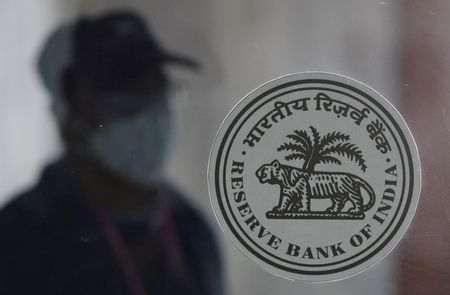 1
1 1
1

By Arsh Tushar Mogre and Prerana Bhat
BENGALURU (Reuters) – The Reserve Bank of India will concentrate interest rate hikes over the coming months in a relatively short tightening cycle, according to a Reuters poll of economists who expect the repo rate to reach its terminal level early next year.
Following a surprise rate rise on May 4, several members of the Monetary Policy Committee called for more in upcoming meetings this year to control sticky price pressures, which hit an eight-year high last month.
That sentiment was echoed in a May 26-June 1 Reuters poll that predicted the central bank would raise its key policy rate by at least 100 basis points over the next four MPC meetings.
The RBI was expected to follow up its unscheduled 40 basis point repo rate hike in May to 4.40% with another move at the policy meeting on June 8 – a “no-brainer” according to governor Shaktikanta Das.
By how much was unclear as forecasts were split six ways, ranging between 25 and 75 basis points. That is only marginally changed from the seven-way split in a similar poll taken a month ago. [RBI/INT]
The repo rate was expected to reach its pre-pandemic level of 5.15% or higher next quarter, according to 41 of 47 respondents. It will end the year at 5.50%, the median showed, 110 basis points above where it is now and 19 of 47 saw it even higher.
“Most of the hikes will come this year and we expect this cycle to end in April next year…the urgency for more hikes will continue to diminish from Q4 (2022) onwards,” said Miguel Chanco, chief emerging Asia economist at Pantheon Macroeconomics.
Indeed, the predicted tightening path for next year was more subdued with only 40 basis points pencilled in the first half before a pause, poll medians showed.
“The RBI was very much behind the curve in terms of its thinking on inflation and what to do on interest rates. It still seems to me they have rose tinted glasses in terms of the future outlook of prices,” Chanco added.
While inflation looks set to remain elevated, reflecting high global energy and food costs, economic growth prospects have started to look bleak. GDP growth slowed to its weakest in a year last quarter on a year ago, the third consecutive slowdown.
This may lead the RBI – which had long prioritised growth over inflation, holding rates steady until abruptly raising them at an unscheduled meeting – to consider ending this tightening cycle less than a year after starting it.
When asked what the terminal repo rate would be, 14 of 26 economists said 6.00% or higher, while the rest pencilled in a lower rate. Forecasts ranged from 5.15-6.50%.
Nearly two-thirds of respondents, 17, said the terminal rate would be reached by end-Q2 2023, roughly in line with the median from the quarterly forecasts. Six said the second half of 2023, while only three said the cycle would go on until 2024.
But economists said much would depend on price pressures over the coming months.
Suvodeep Rakshit, senior economist at Kotak Institutional Equities, said if inflation were to remain in the 6%-7% range well into the current and next fiscal year, the terminal rate would have to be higher than he currently expects.
“We have to shift it (the terminal rate) higher, closer to where you’re seeing your one-year-ahead inflation pan out. It is not a number cast in stone, it will evolve along with the inflation trajectory.”
(Reporting by Arsh Tushar Mogre and Prerana Bhat; Polling by Anant Chandak, Devayani Sathyan and Md Manzer Hussain; Editing by Ross Finley and Barbara Lewis)